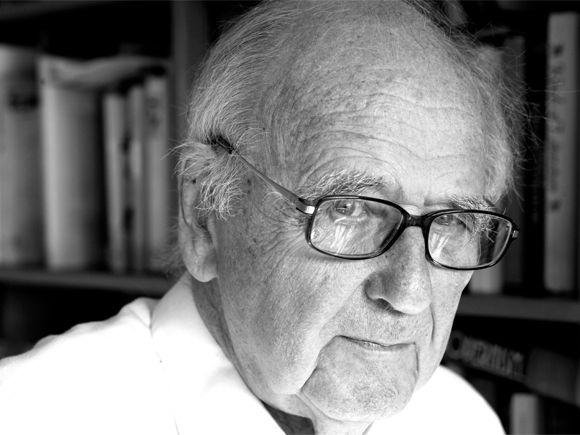The cultural-political monthly Encounter was published from 1953 to 1991. If it is remembered nowadays, it is usually in connection with the revelation that, for the first decade or so of its existence, it had secretly been funded by the CIA (via the Congress for Cultural Freedom or CCF) and the British Foreign Office (via its covert propaganda unit, the International Research Department or IRD).
I was dimly aware of this history when, in August 2020, I listened to a London Review of Books podcast about the literary critic Frank Kermode, who had died 10 years earlier. Kermode had been a prolific contributor to the LRB; he had also co-edited Encounter, before resigning when the circumstances of its funding by the CIA and IRD came to light in the spring of 1967.
According to Mary-Kay Wilmers, the LRB’s longtime editor and proprietor, Kermode had been known in the LRB office as “SSF.” Sly Sir Frank, she explained, was a “malign” character who maintained close ties with her “leftish paper” despite “the fact” that he “was connected with the CIA, or the Congress for Cultural Freedom, which was a CIA outfit.” The “contradiction” between these two positions “would have been something that quite pleased Frank.” Although he disliked being reminded of the Encounter affair, he might even have been “secretly quite proud of the fact that he was… sneaky, and the fact that he was successfully sneaky was probably particularly appealing to him.” What form did this successful sneakiness take? Convincing people that he had known nothing of Encounter’s true sponsors.
Wilmers’s comments surprised me. At the time, I was trying to decide whether or not to write a book about Kermode (like me, his papers reside in Princeton, New Jersey), and the man she sketched bore little resemblance to the one I envisaged. Before I really knew it, I had taken the plunge. The story that began to emerge was complicated and far more interesting than the LRB podcast could permit. One part of it was especially revealing: what Kermode did once he knew, and knew that everyone else knew he knew, the truth of Encounter’s arrangements in its early years.
On 14th February 1967, the New York Times published a front-page story confirming that the National Student Association had taken money from the CIA in exchange for steering its members towards anti-Soviet positions. Over the next two months, there was a cascade of further revelations about the CIA’s cultural-political activities. Kermode was agitated, as was Stephen Spender—one of Encounter’s founding co-editors, and by then its editor-at-large. What bothered them was less the revelations themselves than the prospect that—in repeating assurances about the magazine’s independence that they had received from Melvin Lasky (Spender’s and then Kermode’s prickly co-editor at Encounter) and Michael Josselson (the affable CIA officer who served as executive director of the CCF)—they could be seen as having lied. Worse, as having lied in the service of a Cold War ideology that, as the war in Vietnam rumbled disastrously onwards, seemed tarnished beyond repair.
On 20th March, Kermode wrote to Spender with the news that Lasky had finally admitted the CIA connection. On 29th March, Kermode wrote to Lasky demanding to know when he had learned of the CIA connection, and stating that if Lasky had known for years then he (Kermode) would have to resign his position on the grounds that Lasky had not only deceived him, but had caused him to be the “agent and carrier” of falsehood. Kermode then travelled to the Isle of Man for four days, where his mother had just died. On 3rd April, Lasky visited Kermode in Bristol, and the two talked for several hours in Kermode’s back garden: Lasky admitted he had been aware of the truth since Josselson told him about it in 1963, and that he had sought to “protect” Spender and then Kermode from the burden of knowing.
Lasky’s disclosures went down badly. Kermode and Spender insisted on a meeting of the Encounter trustees, and one was scheduled for 20th April. But now, Kermode and Spender changed tack. It would, they agreed, be better for Encounter if Lasky were to depart and that the magazine’s editorial voices were theirs alone—ideally, with the assistance of a managing editor to handle day-to-day affairs. Power without overmuch responsibility.
The 20th April meeting was heated: Lasky accused Spender of hypocrisy for getting bent out of shape by the CIA revelations when his own salary had secretly been paid by the British IRD; Spender stormed out, irate and possibly incredulous. (I tend to the view that the CIA was news to Spender, but the IRD is another matter.) Although the meeting was inconclusive, in its aftermath Lasky seems briefly to have been amenable to resignation. Once it became clear that he had resolved to stay, another clear-the-air meeting was scheduled on 5th May in the Daily Mirror offices of Encounter’s proprietor, Cecil King, chairman of the International Publishing Corporation.
The CCF had passed ownership of the magazine to King in 1964, intending to insulate it from attacks on its independence or credibility. But even this arrangement now seems to have been dubious. King maintained links with the intelligence services in the UK and US, and it seems likely that the CCF continued to pull some or all of Encounter’s strings. In an undated letter of February–March 1967, Kermode informed Spender that he had just received “a note from John Le Carré [David Cornwell] in which he speculates… that E’s present course of funds might still be a channel for supplies from the old firm. Perhaps just a guess, but DC is very well informed and would make good guesses.”
Whatever his motivations, King determined that Lasky’s services were indispensable. Despite lobbying from Kermode, the Encounter trustees agreed. Kermode therefore handed over both his own letter of resignation and one from Spender (who had left for a visit to Chicago). In his 1995 memoir, Not Entitled, Kermode would reflect that, like a naval vessel forced to engage superior opponents, he had been “outclassed” and “outmanoeuvered.”

Writing to an American friend on 9th May, Kermode had already begun the process of detachment: “In all these recent tumults I am the candid man, the man who has nothing to hide, which is true, but I go on the radio and television and behave exactly like a man who is famous for being candid and have nothing to hide, just like Sartre’s waiter playing the waiter role.” As for the final meeting with King, it was “like CP Snow with even worse dialogue: a newspaper baron with nobody to beat but me does not put forth his power but smiles politely as I sit candidly before him.”
This self-dramatising lugubriousness was not just a rhetorical posture. The problem was Spender. He had announced, via the front page of the previous day’s New York Times, that “in view of the revelations that have been made and allegations which may still be made about the past sources of Encounter funds, I feel that any editor who was knowingly or unknowingly involved in receiving these should resign. I have done so.” In the follow-up report on 9th May, Kermode took a more circumspect line. Lasky’s conduct left him without the “foundation of confidence on which I could cooperate with my co-editor.”
So it was that Kermode found himself in a spot. Should he affirm the truth that their resignations were the result of a power-grab gone wrong? Or should he allow the grandstanding pastoral of a friend and colleague desperate to protect his reputation, and with it his livelihood as a literary careerist? As usual, Kermode chose Forster over Aristotle: friendship first, and on something like principle. Kermode found ways to fudge the issue, and Spender could tell his version of events unimpeded. The rub was that performing this sort of candour without being fully candid debased the currency not just of plain speaking—frankness, if you will—but of friendship too.
But I think that Kermode came to see a more fundamental problem with the Encounter project. Its origins lie in the question that Spender pretended to have answered on principle. Why didn’t Kermode and Spender resign once they learned of either the original CIA-IRD funding or the fact that they had been deceived about it, the more so after Le Carré gave them reason to suspect the integrity of arrangements under Cecil King? The short answer, of course, is their belief that they would have been good for Encounter and that Encounter would have been good for them. But it is the conditions of this belief that are most telling. In all the correspondence that I have read from 1966–1967, neither man deviated from the view that no matter where its funding came from, Encounter had been and remained editorially independent.
Kermode and Spender were worried they had lied in the service of a Cold War ideology that seemed tarnished beyond repair
They had a point: after some boundary-setting back-and-forth between the editors and the CCF in the 1950s, neither the CCF nor Cecil King’s organisation showed the least interest in asserting (to borrow a phrase from the founding editor of the LRB, Karl Miller) “a proprietorial right” in respect of the material published.
Although Encounter was never going to offer space to Marxists or the marxisant, such a view was far from naive or wilfully blind. As Louis Menand puts it in 2021’s The Free World, the CIA realised that it would be counterproductive to insist that its publications remain uncritical of western policy: “The fact that dissent was tolerated in the United States was a major Cold War selling point.” Freedom of thought and expression was not only a clear difference between life east and west of the Coca-Cola line, but could be weaponised in the struggle against the Soviet bloc.
Kermode’s most celebrated book, The Sense of an Ending, was published just a month after the Encounter crisis reached its zenith. In it, he treats political ideologies as no more than another of the “concord fictions” to which we turn in trying to bring order to the tangled woof of our existences. A fit subject for literature and literary criticism, but wholly inadequate as a guide to—much less as a frame for—literary or cultural enquiry. It is, in brief, easy to see how Kermode was drawn to the urbane pluralism that Encounter worked so hard to cultivate.
And yet, and yet. Here is Menand again: the CIA’s ruse of propaganda-through-dissent “meant that writers who imagined themselves as having a critical distance from American policy, or a sceptical relation to capitalism or consumerism or militarism or vulgar anti-communism, were actually taking the party line. They did not need to be bought out because they had been on board all along.” Although Kermode would later figure this out for himself, I do not believe that he had done so in April and May 1967. Nor, crucially, did he at that point understand the impact of what had just been revealed.
To many of those on the left, the exposure of CIA funding merely confirmed that which they already believed to be true: liberal pluralism was a sham designed to spare the blushes of a military-industrial complex that, in its turn, propped up the inequitable structures of capitalist society. Whatever the successes and failures of Spender and Kermode and numerous others in disassociating themselves from the CCF and its works, from this perspective the CCF project—and with it doctrines like the priority of art over politics—was cast firmly on the wrong side of history.
Ultimately, what troubled Kermode’s memories of Encounter was neither shame nor secret satisfaction that he had danced to Langley’s tune and got away with it. He was instead conscious of having helped to bring about a catastrophic loss of credibility for his style of literary and cultural criticism. Perhaps there was some queasy relief, too: if he and Spender had succeeded in taking over Encounter, no amount of tactical water-muddying would have allowed them to salvage their reputations.












